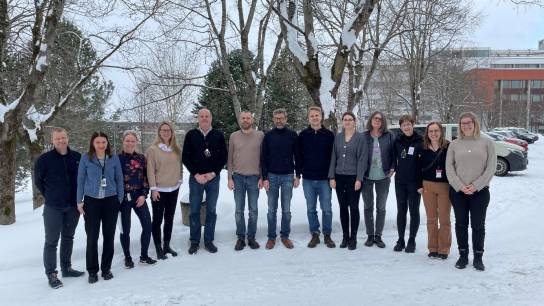LeadtoTreat 2nd progress meeting
On the 14th-16th March 2023, the LeadtoTreat consortium gathered for its second progress meeting in Trondheim. The meeting was hosted by SINTEF and took place at SINTEF's locations in Trondheim. Besides the consortium, we were happy to have two members of the external advisory board (EAB) to join the meeting and contribute with their expertise. The two and half meeting days were dedicated to the work progress achieved during the first 12 months of the project and to planning the next activities, including the upcoming project review meeting. All work package leaders presented the ongoing activities and their scientific and management results since project start. The project is progressing according to the plan, and here are some of the highlights summarising the first 12 months of our activities:
- We have completed the initial selection of potential antibiotics and potentiators to be included in the first round of screening.
- We have selected a panel of 23 Staphylococcus aureus strains for use in combinatory screening of antibiotic effects in planktonic and biofilm in vitro assays, including: three commercially available S. aureus and 20 clinical MRSA strains isolated from patients. The MRSA isolates have been initially characterized at the phenotypic and molecular levels. assigned to 20 MRSA clones, both pandemic and sporadic, representing hospital-, community- or livestock-associated clones.
- We have performed the first screening of antibiotics including MBL-AB01, a SINTEF proprietary, highly potential, but difficult to deliver antibiotic, on the clinical isolates of MRSA and demonstrated high antibacterial activity against multiple strains.
- We have discovered several combinations of antibiotics and potentiators with a synergistic effect.
- The partner NanoTag completed two rounds of alpaca immunizations, with a third round ongoing, and screening of nanobodies is ongoing.
- In the preparation phase for up-scaled production of lead candidate MBL-AB01, we have optimised the fermentation process to increase the yield.
- First nanoformulations of MBL-AB01 were produced, characterised and tested against MRSA.
- We have organised three project meetings and presented the project at the annual conference of the European Technology Platform on Nanomedicine (ETPN).
The achieved results and the coming activities were extensively discussed by all participants. The EAB members provided valuable feedback and comments and several of their suggestions will be implemented into the plans for the next coming months. All in all, the 2nd progress meeting in snowy Trondheim was highly productive and enjoyed by all participants.

